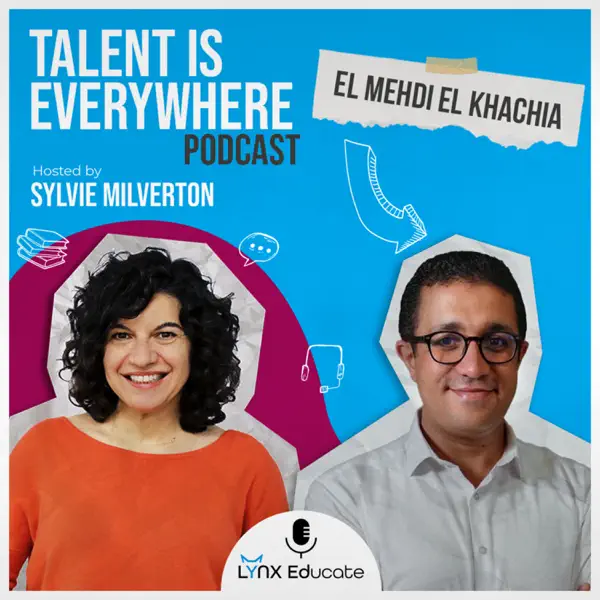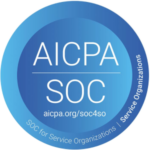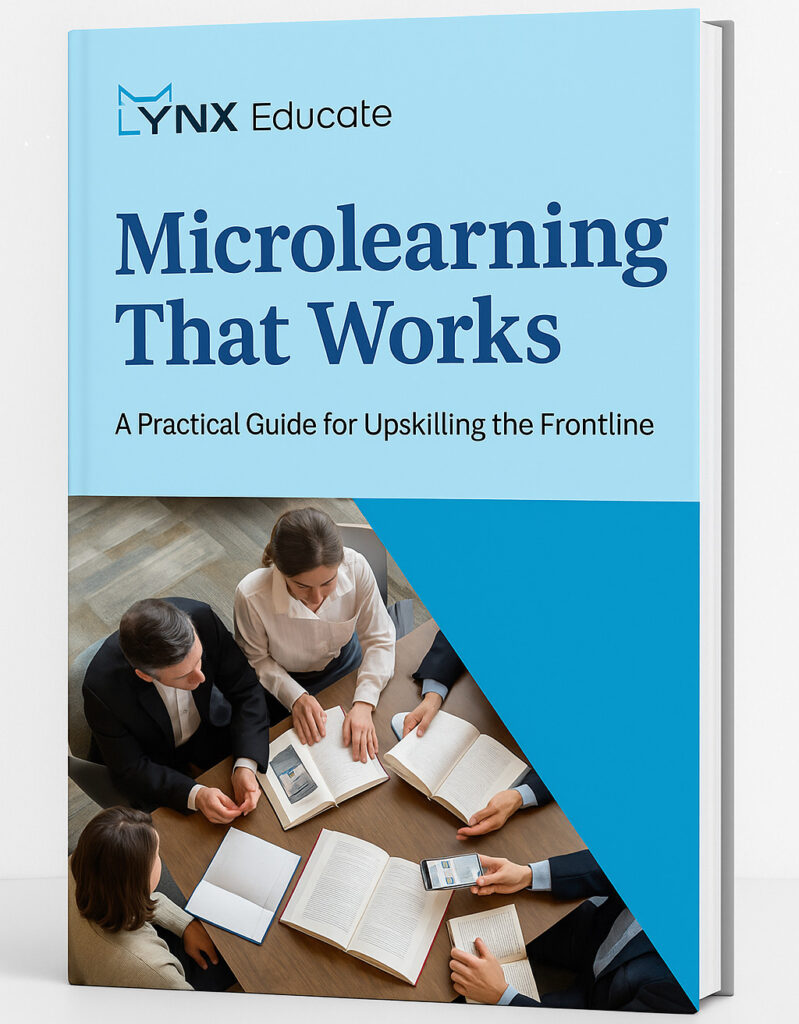#2: El Mehdi El Khachia - Season 2, Episode 2 - Talent is Everywhere!

About the Episode:
In this episode of “Talent is Everywhere”, Sylvie Milverton interviews El Mehdi El Khachia, L&D Director at Capgemini. El Mehdi El Khachia shares insights into the topic of emotional intelligence and a program that he launched for his company that aims to enhance employees’ capacity for empathy. El Mehdi El Khachia also highlights the importance and necessity of learning soft-skills for future ready roles in the workplace and its relation to interpersonal relationships – even outside of work.
Transcript
El Mehdi El Khachia:
It’s not about, you know, suppressing or ignoring the emotion. No. You have to feel the emotion. You have to experience the emotion. The thing is, how can I bring intelligence to that emotion?
Sylvie:
Hi, I’m Sylvie Milverton, CEO of Lynx Educate. This is Talent is everywhere. We’re here to talk about how to keep talent and how to develop talent in order to build a strong business. We’ll interview leaders to hear their best experiences of how they invested in people. So welcome to the podcast. Today we have a special guest who I met on LinkedIn, El Mehdi El Khachia, and my pronunciation, let’s see if it is good. He is now the Central and South L&D director at Capgemini. The scope of about 15 countries, he is based in Morocco, and today we have a special treat because he is going to tell us about a really interesting program that he’s been able to launch at Capgemini around emotional intelligence.
And when we first met, what was interesting to me also, was your personal story that you have a background in engineering, computer science, and you got into HR. So maybe before we dive into the emotional intelligence, you can tell us a little bit about your own journey of how you entered this exciting world of HR.
El Mehdi El Khachia:
Thank you, Sylvie. My pleasure to participate in your really interesting podcast. And, such a pleasure to share a little bit of my story about, and on, emotional intelligence. So, the journey started back, you know, in 2011, and as you said, Sylvie, I have an engineering background. So, I started working initially as a computer science engineer for like two, three years, and then switched progressively to project management, still within the IT sector.
And in 2011, I had to figure out, and came up with a topic for my thesis at that time, master or MBA thesis, around management, you know. So, the first thing I did that time was to check a little bit of the trends regarding management topics in the research area.
And one of the topics that, you know, was kind of weird for me in the world of management was emotional intelligence. So, and that was actually published by the PMI.org website, the Project Management Institute. So, there were several, you know, topics, research about emotional intelligence. So, I said, okay, what had, you know, emotional intelligence to do with the management area.
And I found that time that there were, you know, several studies showing the impact of emotional intelligence on the managerial performance, on people, on well-being, and so on and so forth. So, that was the starting point to get, you know, very interested in this topic and in human-related topics in general. So, I, you know, made the thesis, I conducted a study that time that confirmed, you know, these findings and the impacts, or the positive impacts, of emotional intelligence on people’s autonomy, people’s satisfaction at their workplace, and so on.
Since that time, I kept, you know, working on the topic in parallel with my responsibility as a project manager, delivering in parallel, trainings to people, and so on. And this is how, when I joined Capgemini in 2013, I, you know, got the opportunity to progressively move from delivery scope to HR scope, you know, taking at first the scope of L&D locally in Morocco, then the responsibility of HR Director for Capgemini, Morocco, Technology Services.
And now, you know, as the, you know, Director of L&D for a regional scope for Capgemini. So, this is how the story, you know, started, and now, it’s actually very much linked to my personal, you know, passion for emotional intelligence and all human-related topics in general.
Sylvie:
And they must be so lucky. I mean, when I think, like, so often a big challenge for HR, it’s to be close to the business and to address the business needs. So, I just think, on both sides, like the HR team, you know, lucky to have you. But probably the business appreciates it because, since you were in the project management role, like, you know what it’s like, the challenges, and how you really need to, you know, train and help the people grow.
El Mehdi El Khachia:
Absolutely. And you’re right, Sylvie, because one of the factors that made it easier for me to switch to HR field is this knowledge about the delivery side, the knowledge about the operations and so on. So, indeed, you know, people in delivery were needed. Someone in HR that knows a little bit of operations and delivery and to make the link with the HR. So that was indeed something, a factor that made it easier for me to move from operations project management to HR.
Sylvie:
And so that must be then how you started with your first emotional intelligence training and coaching project. Maybe you can tell us about the first one and how it started with your first plan?
El Mehdi El Khachia:
Yeah. Of course.
So, the, the story of, emotional intelligence with Capgemini started actually in 2020 when Covid started, and we started, you know, talking about Covid that time. So, I had, an interview with one of the, senior managers, in the group. So he was looking for a project director at that time. So he, asked for interview, to check my CV and resume and so on.
So we were talking, and while talking about myself, I mentioned the term emotional intelligence, right? So I said I conducted the study, I delivered trainings and so on. And he said, well, can you tell me more about emotional intelligence? So I started talking about emotional intelligence. And at the end he said, are you able to apply this at home, actually, are you able to manage your emotions at home?
That was a really interesting question. And of course, the answer is, you know, it’s very hard to say yes. The answer is yes or no. Depends. You know, there are situations. Yes, we are good at handling emotional situations where we need to deploy more effort. You know, so he was really interested. And he said at the end, you know, forget about the job position.
Forget about the project director. I need you to do something different for my 23,000 people. You know, I need you to come up with a training for them on emotional intelligence, because I clearly see the need. And I am aware of the impact that this form of intelligence can have on people. So really, I need you to design something for my team, you know, to develop their emotional intelligence.
So he said, I’ll give you all the logistics, you know, you need the sponsorship, the budget, and so on. Just go ahead. Can you do this for me? Of course. This is something I love doing. You know, this is my passion. I said, okay. Yes. And this is how we started actually designing a very, let’s say, adapted program for his population.
His team and especially we started with a population of managers, you know, at first, helping them to develop their emotional intelligence. At that time, we made a pilot, you know, training to see what are the things that are working fine, things that should be improved. And then after we came up with the final version of the training that was deployed, you know, for the whole team, and it continues today to be deployed across the globe and, you know, deliver it, with several languages, not only in English, but in French, Spanish, Portuguese, as well, and so on.
So, this is how it started and it’s continue, you know, to be shining all over the globe.
Sylvie:
Amazing. And so I like sort of practical things, so like how, like, tell me about the program. Like how does it work? Like, is it in person? Is it one day, two days? Like, do they do activities? And what do you, actually how do you teach emotional intelligence?
El Mehdi El Khachia:
Yeah. Initially, the format that we came up, you know, with initially. So which was like, virtual training hundred percent. But what we did actually, is that we designed e-learning side of the training, through which people can get the fundamentals of emotional intelligence before taking part of the virtual workshop, because we wanted the training to be really hundred percent practical.
It’s not theoretical, it’s practical. So the theoretical part is provided through an e-learning platform, which is, you know, very smooth, very light. Just to get the fundamentals. What are emotions, what is emotional intelligence, why it is important and that’s it. So far, the training globally is composed of four workshops. But before taking part of every workshop, you have to take the e-learning as a prerequisite to get prepared for that workshop.
Let me, you know, give you an example. The first dimension that we talk about in emotional intelligence is about self-awareness. So people get the fundamentals about self-awareness through an e-learning, you know, pathway, and through which they get to know what is self-awareness, what is self confidence, what is, you know, getting to connect with our emotions. And so, then they take paths, you know, all the workshops, the first workshop which lasts, you know, one hour and a half, and we provide people with practical exercises, to reflect on themselves, to reflect on their experience.
And then we provide feedback, you know, and what is amazing about this workshop, Sylvie, is the level of interaction and the level of knowledge that is shared by people. You know, because emotions are common to everybody. You know, the moment someone or the first person opens up to the others, you know, the flow continues to progress and everyone is opening up to the other one.
So it’s really interesting. So this is how we deploy the program. It lasts in general, one month, one month and a half, you know, and with the pace of a workshop per week, one workshop per week, so one hour and a half per week, and of course, there is a 30 minutes e-learning preceding the participation to the workshop.
And one more thing I forgot to say is that before taking part of the training, there is an assessment that is optional and suggested to every participant just to see, to try to measure somehow his or her level of emotional intelligence. And then after what is suggested is that three months after the training, you can have a Post assessment or post training assessment to see if you made, you know, some progress, regarding your emotion or your EQ level. I hope that was clear enough, Sylvie.
Sylvie:
Yeah, no, totally clear. And so I guess when you’re in these workshops and it’s sort of a big group of people, it must really open like some kind of a vulnerability in a good way. And I suppose that it creates a much stronger, you know, team bonding. And maybe I should have asked you before, but now I have the question, like when that leader during Covid would say, listen, we really need this kind of, you know, emotional intelligence training for the team. Was it because people were remote and feeling disconnected? Was it because there was like a tension in the team, like what was the problem that he was wanting to solve?
El Mehdi El Khachia:
Yeah, that’s really a good question. Well, initially he showed or he talked about his interest to deploy this training because he clearly felt the need at his level First. You know, we were in a Covid period, so everyone was working from home, and we had, so many, uncertainty, let’s say, around us. This is one thing. The second thing is that so many pressure, because we had to do so many things in one place. And the third thing is that we were disconnected from people.
We didn’t know how everyone is feeling, you know, especially the team, you know? So, you know, people were stressed. People were struggling to get connected to each other. People were also, let’s say, there was so many, information, and fake information around us at that time. So that created a lot of stress, frustration, anxiety. And we need people to have empathy, especially for a management site, you know? So, I mean, I really loved his idea to start with managers because he needed his managers to show empathy to people. This is how you can really connect with them, you know, so it’s about it’s all about, you know, business project and so on.
But initially it’s about people, you know, this is how you achieve your objectives, connection with people. So he asked us to work with them – Managers empathy. You know, this is how you drive your people.
Sylvie:
And did you see like specifically can you remember back like some specific examples like either a manager that would have come to you and say, oh, this was a great experience because X, Y, Z, or even some team members that said, wow, our way of working is improved.
El Mehdi El Khachia:
Absolutely. We, were really lucky to get so many feedback about that. Some positive was, people were like first aware of themself. Right? So they were aware of the things that were kind of wrong. And they used to do, on a daily basis, mixing between the professional life and the personal life, you know? So working remotely is the best opportunity to, you know, make this kind of confusion, you know, so people were, like, everything that they experienced at professional level, they bring it to the personal level as well, so. And the impact was straightforward on home, actually on kids, on the beloved people, you know, so people started to be like, oh my God, why, I am bringing this to my beloved people. You know, I should make the separation. And how can I make the separation? This is the question, actually, yes. There are techniques. There are, you know, things that you can do to make sure you are splitting or separating the two, you know, sides.
So by providing these techniques, people were able to be a better version of themselves when they finish their work in there. Right. The second thing is they were aware of their vulnerability. And when they are candidates, for example, to what we call amygdala hijack, you know, when we are under the control of our emotions.
So what? Let me give you an example. At the end of the day all of us, you know, are tired, kind of stressed, right? There is something right. This is the best moment for amygdala hijack. Amygdala hijack loves people tired. Loves people Stressed. Loves people who are really, struggling, frustrated, with something so much. so once back home. Or once we connect with our family, you know, the very small detail can, you know, explosions, everything around you, you know, and I always bring this story, to, people who take part of the training of a senior manager, you know, who is really performing at his work. He is one of the best managers I have ever met.
He shared this story with me one time. One time, he spent a wonderful day working in the office. He managed really difficult meetings. Difficult Clients. But he made everything, you know, fine. It was really excellent. And he was, like, driving back home. His commute in between two cities, one hour, you know, to arrive to his home.
So he once back home, he was trying to open the door, but the door is not opening. Hes trying. The door is not operating, he’s trying. The door is not open. So what? You know, once his wife opened the door, it was like: What is this serious? I am driving one hour and a half from, you know, like Casablanca. And I am tired and you know that I need to relax. And so it was like, you know, plummeting, you know, the mood of everybody, you know, around him. For what? For how much time he had to wait for 30s 40s to see. So this is really amazing when you see the control of emotions and he’ll share this story, you know, three months later, it was like telling me I really felt stupid doing that.
You know, I am back to my beloved people. You know, I make sure that I am controlling myself during all the day. But once back home, I did completely the opposite, you see. Which brings me back to the question of that senior manager when he said, do you apply this at home? See, so this is the challenge.
This is really the real challenge. You know, when we say people who are emotionally intelligent and try are good in finding this balance between, you know, private and professional life
Sylvie:
and it’s like amazing support, actually, that Capgemini does that because I feel like a lot of times we might think like, okay, well, that person, you know, he has to figure it out. Like you have a hard day. You’re somebody who gets angry. You’re taking this out on for one minute, snapping at your child or snapping at your partner, you know, find a therapist or whatever. But the fact that CapGemini, I could be like, oh yeah, we are creating the conditions of this and these are the people that we’re working with every day.
And so we’re going to invest, you know, time and money to help this. And maybe, okay, maybe you have deeper problems. And we could have a therapist or you have your own personal, you know, management. But the fact that you can make those kinds of impacts, it’s actually, it’s really wise. And I think, you know, a lot of companies don’t really focus on that. And also when you’re the kind of person that can come home and be snippy, you can also be snippy with your team. And you can you, you know, you’re not managing yourself and then you’re creating this, like, kind of dark cloud. And it just creates like a negative, negative consequence.
And so have you, like, now integrated this like in the Capgemini way. Like, are you – like do you kind of keep up with this? And now you have it in many countries?
El Mehdi El Khachia:
Absolutely. So, well, we are continuing our deploying the training, as I said, across the globe, more than 54 countries. But let me say also one thing that’s really helped us to have this awareness about the importance of such training for our people is one report that was published by Capgemini Research Institute in 2019.
That was you know, titled, you know, emotional intelligence or the power of emotional intelligence in the era, or the age of artificial intelligence, you know, and the reports consisted of, you know, bringing some insight, following some assessments conducted with, I think more than 1200 managers worldwide, different sectors, different, you know, industries, to try to understand what are the key competencies or key skills that we will be looking for in the next five years, you know, next ten years in this boom of artificial intelligence and amazing, you know, more than 80% of the interviewed, managers were saying we will be looking for people who are good at what? Good at client facing roles. Right. And deep dive in a little bit to this. They were referring to the human skills, you know, human skills and emotional intelligence. You know, people are really aware of themselves, people who are good at managing, others and understanding those emotions. People are good at the social skills and so on.
So that was really one, factor that help us, have the right level of sponsorship across, you know, the, the group. And today we are deploying the program in different formats, you know, depending on the local needs. Sometimes it’s face to face when we can afford, to have that, you know, depending on the, you know, location, of people depending also on the, bandwidth and availability of people, we do have also several languages through which, the, the training is deployed.
But before doing all of this, we had really a good training. The trainer, to have more facilitators on the topic. So we had the chance to, train more than, 30. You know, facilitators on this, and this is, actually also, I forgot to mention, thanks to, you know, a great partner who initiated the program with me from Brazil.
You know, when it’s such value. And it was really, you know, the train, the trainer was, let’s say, the trigger, to make this program at a larger scale. And now it’s been, you know, rolled out in several countries, different formats, as I said, and we keep working on new version today. Let’s call it Eco 3.0, you know, which is planned for, 13, 20, 25.
Sylvie:
Wow. What a good ambition. And I guess, you know, all these human skills, you know, those sorts of assessments and whatever, but, you know, they can be learned, like, because I think sometimes we think like, oh, this person isn’t a good people person that doesn’t know how to manage his or her emotions or they’re not a good leader or they learn how to manage.
But in fact, you can, you know, teach these things. And a lot of it, I imagine I haven’t done your course, but, you know, the, as you say, self-awareness, like when you feel a certain thing, you know, maybe you put a bracelet to say like, oh, I know that after a long day, when I come to the door, remember to take a deep breath so that I can reset myself or, you know, those sorts of things.Not you’re a bad person. I think you’ve just sort of, you know, learn to learn to manage, manage the emotions.
El Mehdi El Khachia:
Absolutely. You know, it’s important to remember that we are all humans and human humans, you know, are, concerned with emotions. You know, the think is, it’s not about, you know, suppressing or ignoring the emotion.
No, you have to feel the emotion. You have to experience the emotion. The thing is, how can I bring intelligence to that emotion? You know, how can I handle that emotion? And this is the thing we, focus on when we try to explain emotional intelligence, especially also because, which is funny. What is surprising is that most of the time when we are in a session, everybody is bringing the example of home example of kids and the relationship with kids.
And for me, this is the real challenge. This is the real exercise when you can say I am really emotionally intelligent or not, because at working place globally, we pay attention to our image, right? So we kind of try to control the emotions, you know, to not show them vulnerability maybe or I’m trying you know, most people, they do their best, but at home we forget about all of this.
But no, this is your real environment. And to practice emotional intelligence, this is when you teach emotional intelligence to your kids. So yeah. So we have well, let me quickly finish with this. Sylvie, is that, teaching the kids sometimes can be tough about emotions, right? So that’s why we encourage parents to, encourage their kids to express their emotion and to let them experience the emotion as well.
No, it’s not about you know, Stop crying. You know, stop yelling and stop. No. What can I do for you? Why are you crying? Can I understand? Yeah, I can understand. I can connect with that, you know. So this is empathy with kids, but it’s, you know, it’s a long journey. It’s a long journey. It needs awareness first, you know what?
I like this expression: take a rendezvous with ourselves, taking time for ourself to reflect on our way, to reflect on our month, on our year, to consider improving ourselves regularly. Do not wait for the end of the year or our new a new resolution. Which is something, let’s say, already late. You know, it’s every day, every month, every week.
Sylvie:
Right. Well that’s lovely. This has been, you know, really amazing. And it’s been such, Yeah. It’s such a pleasure to learn. You know, when you first spoke and you told me about your program, I didn’t, you know, realize the depth of it and how, you know, the impact that it had. I mean, I saw the numbers and everything, but to see, like, you know, your commitment to helping people grow and be in touch with their emotions.
So there’s so many other things we can say. And I guess I’ll, you know, just finish, you know, in a lot of these, you know, companies where it’s a lot of men actually having jobs. I think it’s a really beautiful to be able to create, you know, the spaces of vulnerability where people can admit, like, you know, sometimes I feel scared.
I feel this feeling like it’s okay to feel the feelings and and manage them. And as you say, in the public space of work, where we tend to be much more hidden of our, of our real feelings. But those are the moments, to share them. Yeah. So to finish, so can people if people want to follow up and learn more about your program, I guess they can follow you on LinkedIn.
Are there any other, places or resources you’d recommend that they find?
El Mehdi El Khachia:
Well actually, I’m very happy to respond directly on LinkedIn. So there is everything, you know, needed there. But also there are reports from Capgemini that are publicly available on the internet, you know, about emotional intelligence. I think there are 2 or 3 reports now have been published about that.
There is also some publications about the program that are public as well. So, this can be shared as well, you know, within the post of this podcast, Sylvie, and I can provide that to you. So they talk a little bit more about the emotional intelligence program within Capgemini. And the impact that had on our people.
So, yeah. So my pleasure to, to provide that, following this podcast.
Sylvie:
Great. We’ll include that in the show notes. And thank you very much already. This is a great, a great pleasure to have you.
El Mehdi El Khachia:
Thank you, Sylvie, and the pleasure as well. And I hope that everyone will enjoy the podcast. Thank you, Sylvie.
Sylvie:
Thanks for listening to this episode of “Talent is Everywhere”. Make sure to subscribe if you like what you heard and give us a follow on LinkedIn to continue the conversation on all things career mobility and talent development.
Is there a topic you’d love for us to cover in a future episode? Or a guest you’d recommend? Drop us an email at hello@lynxeducate.com
And if you’re looking for support on your talent development strategy, head over to www.lynxeducate.com to learn more about our career mobility solution. That’s “L”, “Y”, “N”, “X”, “educate”, “.com”.








